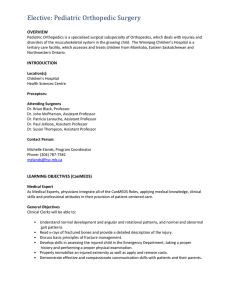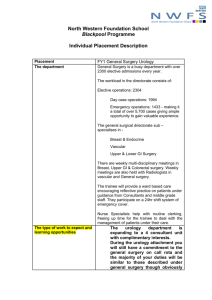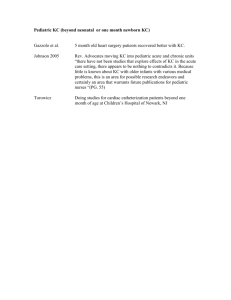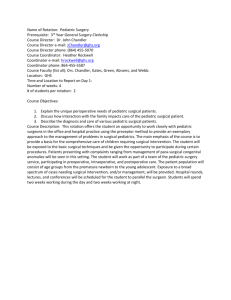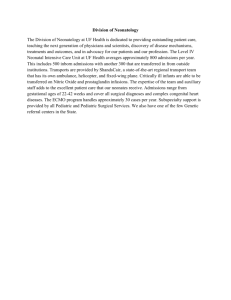Elective: Pediatric Urology Elective OVERVIEW
advertisement
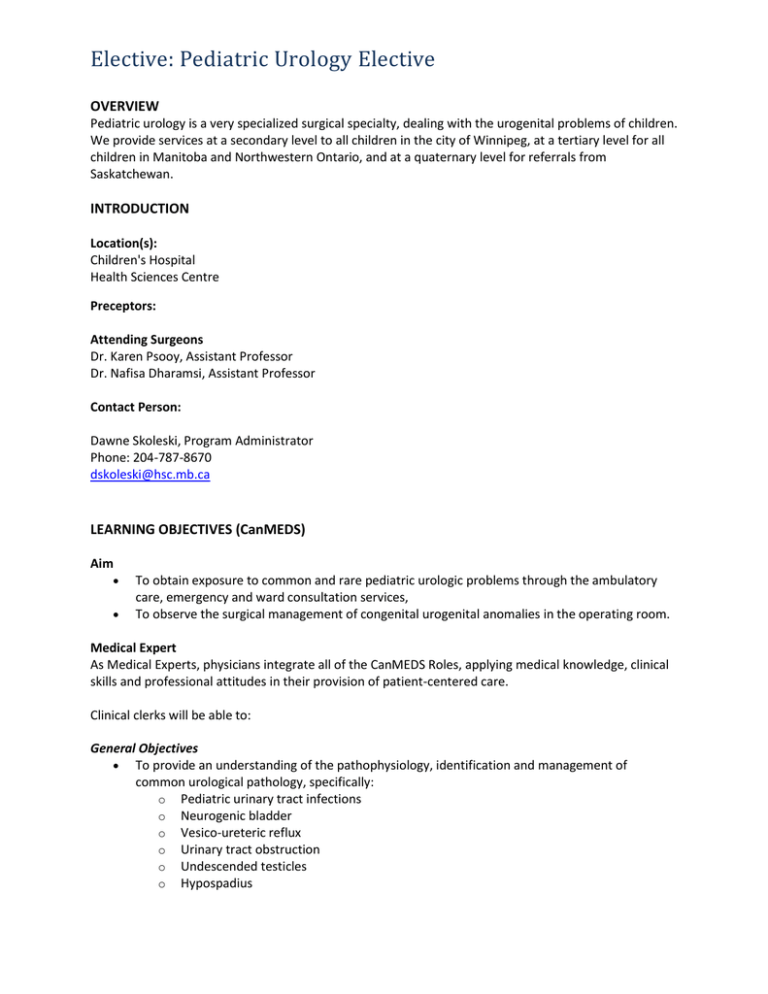
Elective: Pediatric Urology Elective OVERVIEW Pediatric urology is a very specialized surgical specialty, dealing with the urogenital problems of children. We provide services at a secondary level to all children in the city of Winnipeg, at a tertiary level for all children in Manitoba and Northwestern Ontario, and at a quaternary level for referrals from Saskatchewan. INTRODUCTION Location(s): Children's Hospital Health Sciences Centre Preceptors: Attending Surgeons Dr. Karen Psooy, Assistant Professor Dr. Nafisa Dharamsi, Assistant Professor Contact Person: Dawne Skoleski, Program Administrator Phone: 204-787-8670 dskoleski@hsc.mb.ca LEARNING OBJECTIVES (CanMEDS) Aim To obtain exposure to common and rare pediatric urologic problems through the ambulatory care, emergency and ward consultation services, To observe the surgical management of congenital urogenital anomalies in the operating room. Medical Expert As Medical Experts, physicians integrate all of the CanMEDS Roles, applying medical knowledge, clinical skills and professional attitudes in their provision of patient-centered care. Clinical clerks will be able to: General Objectives To provide an understanding of the pathophysiology, identification and management of common urological pathology, specifically: o Pediatric urinary tract infections o Neurogenic bladder o Vesico-ureteric reflux o Urinary tract obstruction o Undescended testicles o Hypospadius Elective: Pediatric Urology Elective o Phimosis To provide the opportunity to see rare and complex urological anomalies. Specific Objectives Demonstrate a basic knowledge and understanding of the more common pediatric urological problems Identify urologic pathology seen on diagnostic imaging Develop skills in assessing pediatric urological patients in the emergency and ambulatory setting, by taking a pertinent history and performing a physical examination Perform some minor technical skills such as Foley catheter insertion and skin suturing Develop skills in formulating a differential diagnosis and in organizing a diagnostic and treatment plan in the management of urologic patients in the emergency, ambulatory and postoperative setting Develop communications skills in dealing with pediatric patients and their parents Technical Skills Foley catheter insertion (if applicable) Skin suturing Communicator Physicians effectively facilitate the doctor-patient relationship and the dynamic exchanges that occur before, during, and after the medical encounter. As Communicators, students will facilitate the doctor-patient relationship: Establish rapport, trust and a therapeutic relationship with patients and families. Listen effectively. Elicit relevant information and perspectives of patients, families, and the health care team. Convey relevant information and explanations to patients, families and the health care team. Convey effective oral and written information about a medical encounter. Maintain clear, accurate, appropriate, and timely records of clinical encounters and operative procedures Address challenging communication issues effectively o Obtain informed consent o Deliver bad news o Disclose adverse events o Discuss end-of-life care o Discuss organ donation Addressing anger, confusion and misunderstanding using a patient centric approach Collaborator Physicians effectively work within a healthcare team to achieve optimal patient care. As Collaborators, students will work effectively within the surgical team to achieve optimal patient care: Demonstrate a team approach to health care Participate effectively in an interprofessional and interdisciplinary health care team. Elective: Pediatric Urology Elective Recognize and respect the diversity of roles, responsibilities, and competences of other health professionals in the management of the surgical patient. Work with others to assess, plan, provide, and integrate care of the surgical patient. Leader Physicians engage with others to contribute to a vision of a high-quality health care system and take responsibility for the delivery of excellent patient care through their activities as clinicians, administrators, scholars, or teachers. As Leaders, students will participate in the activities of the surgical service, making decisions, allocating resources, and contributing to the effectiveness of the health care team: Employ information technology appropriately for patient care. Allocate finite health care resources Health Advocate Physicians responsibly use their expertise and influence to advance the health and well-being of individual patients, communities and populations. As Health Advocates, students will responsibly use their expertise and influence to advance the health and well-being of individual patients, communities and populations: Concern for the best interest of patients Identifying health needs of individual patients, and advocate for the patient in cases where appropriate Promote and participate in patient safety Scholar Physicians demonstrate a lifelong commitment to reflective learning, as well as the creation, dissemination, application and translation of medical knowledge. As Scholars, students will demonstrate a lifelong commitment to learning: Demonstrate the ability for continuing self learning Discuss the principles of surgery and the application of basic sciences to surgical treatment. Demonstrate appropriate presentation skills, including formal and informal presentations. Critically evaluate medical information and its sources and apply this appropriately to clinical decisions. Critically appraise the evidence in order to address a clinical question. Integrate critical appraisal conclusions into clinical care Professional As Professionals, physicians are committed to the health and well-being of individuals and society through ethical practice, profession-Led regulation, and high personal standards of behaviour. As Professionals, students are committed to health and well-being of individuals through ethical practice, profession-led regulation and high personal standards of behavior: Elective: Pediatric Urology Elective Exhibit professional behaviors in practice, including honesty, integrity, commitment, compassion, respect and altruism. Demonstrate a commitment to delivering the highest quality care. Recognize and respond appropriately to ethical issues encountered in practice. Recognize and respect patient confidentiality, privacy and autonomy. Participation in peer review Manage conflicts of interest Maintain appropriate relations with patients. Demonstrate awareness of industry influence on medical training and practice Recognition of personal and clinical limitations INFORMATION These are locations, readings, evaluations, call responsibilities, etc. Required Reading Lawrence Essentials Of Surgical Specialties, 2nd ed. Chapters of particular relevance to this rotation include: Chapter 2 - Pediatric Surgery: Surgical Diseases of Children Chapter 9 - Urology: Diseases of the Genitourinary System Teaching Unit Inpatients (if any) are located on CK3. Call Responsibilities Will do joint call with a resident one weekday and one weekend of home call. Evaluations Please speak with Dr. Psooy the last week of the rotation for face to face feedback. Otherwise evaluation will be filled in separately and sent in. The service evaluation form should be completed and returned to the Surgical Education Office by the student at the end of the surgical rotation. WARD ACTIVITIES These are examples of schedules, expectations, rotation details, etc. All the details below are subject to change. Expectations The student will function under the direct supervision of the urology resident and the attending staff. Elective: Pediatric Urology Elective Students are expected to attend all ward rounds, ambulatory clinics, operations, and academic half days. The student will accompany the resident to ward and emergency room consultations. The Clinical Clerk tutorials are mandatory, and students are excused from any other activities to attend these valuable sessions. Operating Room Schedule Monday 0800-1530 Operating room (JL2) Dr. Dharamsi Thursday 0800-1530 Operating room (JL2) Dr. Psooy Clinic Schedule Tuesday 0830-1600 Clinic CH1-Unit 4, Drs. Dharamsi & Psooy Wednesday 1300-1600 Clinic, CH1-Unit 4, Drs. Dharamsi &/or Psooy Friday 0900-1600 Clinic, CH1-Unit 4, Dr. Dharamsi Teaching Sessions Wednesday 0900-1200 Urology Academic Half Day, Chown Room FE019-Community Services Building, HSC Service Rounds Monday 0730-0800 Ward rounds, CK3, if inpatients Tuesday 0800-0830 Ward rounds, CK3, if inpatients Thursday 0730-0800 Ward rounds, CK3, if inpatients Friday 0830-0900 Ward rounds (CK3), if inpatients
